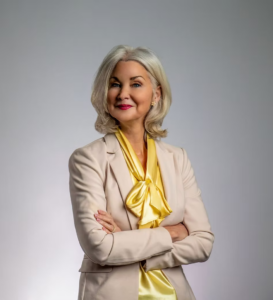Personal Branding: Why It Matters and How to Make It Work for You

Back in the day, personal branding used to be reserved for A-list celebrities – you know, one-name wonders like Beyonce, Cher or Madonna. Social media and technological advances shifted that paradigm and in today’s competitive world, establishing a strong personal brand is essential for business leaders, executives and entrepreneurs.
I’m defining personal branding as creating a thoughtful, cohesive image that communicates your value, expertise, and uniqueness to others at work and/or at home. When executed well, personal branding establishes the kind of credibility that authentically opens doors, secures opportunities, shatters glass ceilings and builds long-lasting success.
As nationally recognized podcast strategist, coach, and branding expert Allison Hare explains, “People are more likely to connect with individuals, not companies. And when you align your personal brand with your values and expertise, you can drive deeper, more meaningful connections.”

Allison Hare, podcast launch specialist for ambitious leaders
Why Does Personal Branding Matter?
If you consider personal branding to just be about self-promotion, think again. It is actually about establishing trust, loyalty, and a strong sense of connection.
According to the “Trends in Personal Branding National Research Study” conducted by Brand Builders Group in partnership with the Center for Generational Kinetics, 74% of Americans are more likely to trust someone with an established personal brand, and 58% would be willing to pay more for products or services from such individuals.
In addition, wisernotify reported that 70% of employers said that a personal brand is more important than a resume or CV in making hiring decisions. So, creating a strong personal brand can help you land a promotion at work, or your dream job.
Hare shares the example of Spanx, where founder Sara Blakely’s personal brand is so deeply interwoven with the product that when customers put on their Spanx, they think of Blakely and her journey. It can be the difference between success and mediocrity in business. (Full disclosure: I created a campaign called Project Household Name for Spanx back in 2002 as a PR consultant that focused on growing the brand by sharing Blakely’s engaging personal story. Excited to see how it continues to resonate so well today!)
Self-Promotion Without Selling Out
So, you might be reading this article with a slight sense of cringe. Perhaps self-promotion feels kind of selfish or uncomfortable. The key is staying true to yourself.
“Self-promotion doesn’t have to mean selling out or hogging the spotlight. It can simply mean showcasing your unique value in a way that feels authentic and natural,” explains Leigh Woisard, a communications professional, keynote speaker and coach. Another part of the personal branding equation is showcasing your value with consistency so that what you bring to the table is clear to others, Woisard says.

Leigh Woisard helps professionals tell and sell their value
Woisard says that one of the best ways to self-promote without feeling uncomfortable is to focus on your “one thing” or differentiator—the unique quality that sets you apart from others. “This could be your creative ability, your leadership skills, or your strategic thinking,” she adds. “Instead of trying to promote everything you do, focus on this standout quality. Promoting your ‘one thing’ gives others a clear picture of what makes you valuable and what you bring to the table.”
Hare agrees, stressing the importance of building your reputation around your unique ability to solve a specific problem. “When you become known for your expertise in one area, you create the foundation for long-term success and growth,” she notes.
Interested in building a powerful personal brand? Here are 3 tips to get started:
- Gain clarity.
According to Hare, the first step is identifying what you stand for.
“This goes beyond simply stating your beliefs—it’s about homing in on the specific problem you are uniquely positioned to solve. By narrowing down your focus, you can become known as the go-to expert in a particular area,” she says.
Hare suggests working with a personal brand strategy firm, like Brand Builders Group, to define your target audience, the problem you solve, and your monetization strategy. She says that once you’ve done that, you’ll be able to execute a clear and powerful personal brand that resonates with others.
- “Tell & Sell” Your One Thing.
After narrowing your focus on your “one thing,” now it is time to promote it. Woisard advises that everything you do at work is an opportunity to highlight your unique value.
“From how you dress to what you share on social media, each action is part of your personal brand strategy. Your appearance plays a critical role in reinforcing your personal brand,” she says. “For example, if your one thing is being a trusted advisor to executives, your professional attire should communicate credibility and trustworthiness. If you’re a creative thinker, your style might be more unconventional or bold.”
Beyond appearance, Woisard notes that what you share with the rest of the world—both online and offline—should align with your one thing. She recommends creating content on social media that reflects your expertise, comment on posts, and participate in discussions that highlight your strengths. LinkedIn is the best social media venue for business content, and you can also create webinars that leverage your thought leadership.
- Build Strong Relationships.
Building strong relationships, especially those that get others to talk about you and your one thing, is critical in creating awareness about your personal brand.
“I advise people to build relationships with colleagues and leaders who share an interest in your area of expertise,” says Woisard. “These individuals can become your sponsors—people who advocate for you when you’re not in the room. Sponsors are essential for career advancement, as they provide visibility and support that can help open doors to new opportunities.”
In Hare’s world of podcasting, networking with influential people and becoming known for your expertise is key. Her Reinvention Room podcast is ranked in the top 1.5% of global podcasts, with over 500,000 downloads. She leverages the podcast to connect with high-profile guests, which in turn expands her influence, network, and business partnerships.
One final thought here: It’s never too late to build your personal brand. Aside from my career in corporate communications and executive coaching, I started focusing on helping people get unstuck and activate their remarkable potential after age 50.
My wish for you is to start doing this at any age, no matter what circumstances you face. Because finding that intersection of what you are passionate about and where you truly excel will transform your life, and those around you, for good.
What does your personal brand stand for? How have you built it?
